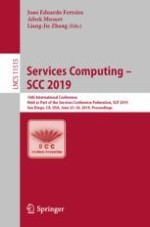2019 | Book
Services Computing – SCC 2019
16th International Conference, Held as Part of the Services Conference Federation, SCF 2019, San Diego, CA, USA, June 25–30, 2019, Proceedings
Editors: Joao Eduardo Ferreira, Aibek Musaev, Liang-Jie Zhang
Publisher: Springer International Publishing
Book Series : Lecture Notes in Computer Science
